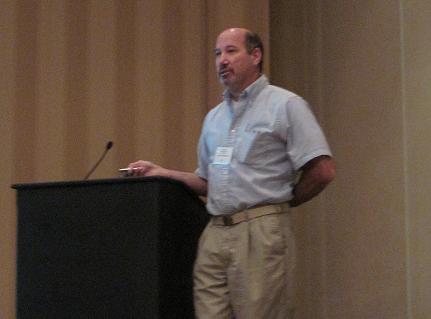The creator of EPANET has retired
Jim Uber posted on the EPANET-Users list that Lew Rossman, the creator of EPANET, has retired. He also sent the code of QHCSIM which Lew published back in 1991 and might be the first public version of a combined hydraulic and water quality solver. Here is Jim’s message:
Lew Rossman has announced on the SWMM-USERS list that he will be retiring from the USEPA as of April 1, 2014, after more than 30 years of service to his profession.
I’d guess that everybody on this list either has communicated directly with Lew over the years, or has heard of him; certainly everybody has used one of his software packages, EPANET. Lew has helped out so many people over his career through his interactions on water infrastructure modeling research, and is widely appreciated throughout the world for his contributions. To say he does not seek the limelight would be the understatement of the century, perhaps. But he will be missed dearly in terms of his work at the USEPA, by engineers and scientists of several different generations.
I was thinking of how to document, in some modest way, Lew’s contributions to potable water systems modeling. A colleague told me yesterday about how Microsoft had recently contributed the source code for Word 1.0 in order to document it’s significant place in computing history. So with that, I am attaching here the earliest know (to me) version of EPANET, in terms of the user’s guide and the source code, dated October 16, 1991. (At that early time, the name ‘EPANET’ didn’t exist, and Lew gave this experimental version the name ‘QHCSIM’.) As far as I know, this code is the first one to combine in one executable both hydraulic and water quality simulation capabilities – from the beginning the hallmark of EPANET. The code consisted of 1487 lines and I am sure fit comfortably on a 1.44 MB floppy drive ;-). A note from the user’s guide indicates that “The program can accommodate 100 nodes, 200 pipes, 10 tanks, and up to 50 pump control rules. For contaminant routing, a pipe can be divided into at most 50 volume segments.”
Perhaps this helps explain, by way of comparison to what is done today, Lew’s dedication to, and impact on, our field.
Here is QHCSIM source code and documentation (opens in a new tab).
Lew, thank you for creating EPANET. It definitely made a difference and surly changed my professional career! I hope now you will have time for EPANET 3.

With respect, Thank YOU Lew Rossman.
Thank YOU Lew Rossman!
Best wishes,
Miklos
Thank you Mr Lew, I wish you all the best!!
Veljko Nikolic, Nis, Serbia
Thanks Lew,
“Long live EPANET”
May all your work be blessed
Martin Darma
Indonesia
for sorry, I did not know you before, but i feel with the valuable rule of your product (EPANET). its so proud for you and for any one to achieve something helpful for mankind. i hope to be like some of you.
Thank you Lew for developing such a useful tool. Wish you all the best.
Shamsuzzaman
Good Evening
How converter EPANET .inp em Shapefile .SHP ?
Thank you, Mr. Lew Rossman.
Thanks a lot Mr. Rossman for give us that wonderful EPANET!!, God bless your mind and keep programming!.
I know Lew mainly from his wonderful and creative SWMM 5 programming but I also know a lot of people who love EPANET. It has been 3.1 years since Lew Rossman’s retirement but he has been a really busy EPA emeritus after 2014. His newer documentation for hydrology, hydraulics and water quality w/ LID are both beautiful and informative. I have learnt so much from his coding and his writing. I think it is time for a reminder tweet.
Thanks, Elad for posting this an your continued EPANET postings.